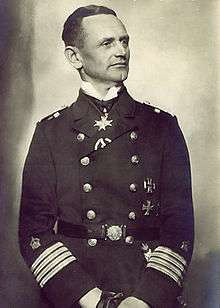Karl August Nerger
Karl August Nerger (25 February 1875 – 12 January 1947) was a naval officer of the Imperial German Navy in World War I, who achieved fame and recognition during the war for his command of the auxiliary cruiser SMS Wolf.
Karl August Nerger | |
|---|---|
 | |
| Born | 25 February 1875 Rostock, Mecklenburg-Schwerin, German Empire |
| Died | 12 January 1947 (aged 71) Speziallager Nr. 7 Sachsenhausen concentration camp, Soviet occupation zone |
| Allegiance | |
| Service/ | |
| Years of service | 1893–1919 |
| Rank | Kapitän zur See |
| Commands held | SMS Wolf |
| Awards | Pour le Mérite, Military Order of Max Joseph |
Nerger was born in Rostock, Mecklenburg-Schwerin. Nerger had entered the Navy as a cadet in April 1893, and as a junior officer participated in the China Relief Expedition during the Boxer Rebellion, where he had also been decorated for bravery and intrepidity. In Summer 1914, then-Korvettenkapitän Nerger had taken command of the light cruiser SMS Stettin, which he commanded until taking over SMS Wolf in March 1916. As captain of the Wolf, he led the commerce raider on a 451-day expedition, the longest voyage of a warship during World War I, until May 1918, and was promoted to Fregattenkapitän on January 13, 1917. In May 1918, he became commander of minesweeper units of the High Seas Fleet, a command he held until war's end. He retired on July 25, 1919, characterized as a Kapitän zur See.
On 15 August 1945, Nerger was interned by the Soviet Union at the Sachsenhausen NKVD camp where he died two years later.
Decorations and awards
For his exploits, Nerger was awarded the highest military decorations of the five main states of the German Empire, a feat achieved only by Kaiser Wilhelm II himself, Franz Joseph I of Austria-Hungary, Field Marshals Rupprecht, Crown Prince of Bavaria, Duke Albrecht of Württemberg, and Paul von Hindenburg, the Kaiser's son General Crown Prince Wilhelm, Nerger, and one other commerce raider captain, Nikolaus Burggraf und Graf zu Dohna-Schlodien.
Nerger received Prussia's Pour le Mérite on February 24, 1918, the day SMS Wolf returned home. This was followed by Bavaria's Military Order of Max Joseph (28 March 1918), Knight's Cross of Saxony's Military Order of St. Henry (25 February 1918), Württemberg's Military Merit Order, and Baden's Military Karl-Friedrich Merit Order. In addition to these highest awards of the major states, he also received the 1914 Iron Cross 1st and 2nd Class, the Knight's Cross with Swords of Prussia's Royal House Order of Hohenzollern, the Military Merit Cross 1st and 2nd Class of Mecklenburg-Schwerin, the Friedrich August Cross 1st and 2nd Class of Oldenburg, and the Hanseatic Crosses of Hamburg, Bremen and Lübeck.
Nerger was named an honorary citizen of Rostock in 1919 and received an honorary degree in medicine from the University of Rostock. In 1920 he began working for Siemens-Schuckert.
Literature
- Peter Hohnen & Richard Guilliatt, THE WOLF - The true story of an epic voyage of destruction in World War One, 2009, Bantam Press, ISBN 0-593-06075-X
- Edwin P. Hoyt, Raider Wolf, The Voyage of Captain Nerger, 1916–1918, New York 1974, ISBN 0-8397-7067-7.
- Roy Alexander: The Cruise of the Raider Wolf, Yale University Press, 1939.
External links
| Wikimedia Commons has media related to Karl-August Nerger. |